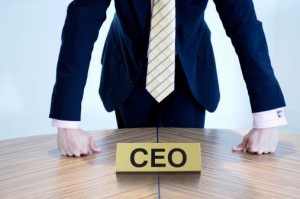 The CEO is mainly responsible for creating a vision for the company, and aligning the internal and external functioning of the company to this vision.
The CEO is mainly responsible for creating a vision for the company, and aligning the internal and external functioning of the company to this vision.
Typically, it is also the company CEO’s job to handle top level external relationships in a manner that helps the business of the company, and to guide employees and senior executive officers towards the objectives that help achieve the company vision. In smaller companies, the CEO will typically have to attend to functional responsibilities.
The CEO Owner of Small Companies
Entrepreneurs who set up their own companies might not be able to hire independent functional managers for all the different functions such as marketing, finance, operations, human relations and technology. Typically, they will focus mainly on creating a customer base and different revenue streams. However, they will also have to keep an eye on the other functions with the help of employees or officers that they can afford to hire.
A frequent problem with the owner CEOs of small companies is that instead of focusing on the really important responsibilities such as developing revenue streams they tend to focus on less critical tasks with which they are familiar and comfortable with. As a result, the management of the business tends to get lopsided leading to serious problems.
Another major problem with small business chief executive officers is that they are unlikely to have a clear idea of the role of CEOs. They might not be able to identify the critical areas or the changes that need to be made in existing policies and practices. Instead, they might adopt certain preconceived approaches for managing the business.
Entrepreneurs who come from business families, and work on the family business, are in a better position in that they will have been exposed to the needs of the business. However, they too will need to identify the changes that need to be made in changing business environments.
The Corporate CEO
Chief Executive Officers of large corporations are more likely to have formal training in business management and significant experience in developing business strategies and translating them into functional objectives. They will typically be assisted by functional managers who are expected to manage the following major functions independently:
- The Chief Financial Officer is responsible for financial planning and sourcing, record keeping and analytical management reporting to the CEO and board of directors.
- The Chief Marketing Officer is responsible for managing the marketing channels and sales force, market research, developing new products, marketing communications, public relations, pricing decisions and customer service.
- The Chief Operating Officer is responsible for the day-to-day operations, including training and guiding employees, using available resources productively, monitoring performance levels and ensuring the availability of required skill sets.
- The Human Relations Officer will be responsible for assessing the human resource requirements, employee records maintenance, employee skills management programs, disciplinary matters etc and will mainly act in a supporting role to the other managers.
- The Chief Compliance Officer or Office Manager will be responsible for complying with the various regulatory requirements as applicable to the company, and ensuring that the employees are aware of and comply with these, typically by developing policies and practices that result in compliance and communicating these to employees and monitoring their adherence.
In addition to the core functionalities above, modern corporations might also have:
- A Chief Information Officer who helps the company to tap the potential of Information Technology for improving the company’s functioning.
- A Chief Technology Officer who will monitor technology developments and help develop meaningful roles for the company in the emerging technological scenarios.
The CEO Job
It will be obvious that the corporate CEO cannot handle all the specialized and extensive roles outlined above. Instead, it will be that person’s responsibility to motivate the chief officers to function in a coordinated manner and develop the business into a cohesive organization.
The corporate CEO will also be responsible for creating a desired image about the company among the public, customers, government and other external entities. Additionally, the CEO should ensure that the company is able to ensure business continuity in the face of different kinds of crises and changes in environment.
The executive CEO will typically report to a Board of Directors appointed by the company shareholders, and will be usually governed by the Chairman of the Board.
Chief Executive Officers are in total charge of managing the business of a company. Their specific roles will differ based on the size of the business. The small business CEO will be directly responsible for business development while the corporate CEO will coordinate the functioning of different functional managers.
Contributed by http://brinenlaw.com/







